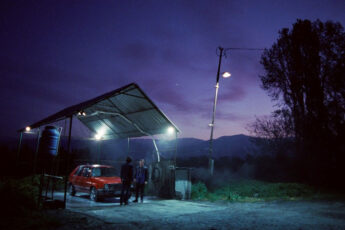
We live in an age of scandal. Hardly any event unfolds without being swept by waves of petitions, open letters, and boycotts. It may be a hopeless task to list them all, but what follows is a non-exhaustive catalogue, for the record and in lieu of a year-end review, of 2024’s film-related scandals. At Cannes, filmmakers and industry workers petitioned and protested over insufficient labor protections. At the New York Film Festival, more than three dozen directors and artists demanded organizers sever ties with Bloomberg Philanthropies over its financial involvement in West Bank settlements. The Avignon Short Film Festival halted its screenings after allegations of domestic abuse against Richard Berry. Actress Judith Godrèche led calls to oust Dominique Boutonnat from France’s CNC, joined by nearly 5,000 film professionals and groups, following allegations of sexual violence. The Polish Camerimage festival faced backlash after its director remarked that pursuing gender diversity risked sacrificing artistic standards. The Venice Film Festival faced three petitions, two about the war in Gaza and one over access restrictions for journalists, and the Berlinale saw protests against collaboration with sponsors tied to far-right politics. Add to the catalogue a petition defending Argentina’s National Film Institute (INCAA) after President Javier Milei’s proposed omnibus bill threatened to slash its funding, and pro-Palestinian activists calling for a boycott of Netflix after it removed the Palestinian Stories collection.
There is reason to believe that something in the structure of these institutions invites crisis. If cultural institutions like film festivals and funding bodies were once seen as spaces of celebration and moral high ground, they now resemble battlefields. On the one hand, one cannot but sympathize with the outraged. Surely, in the idealistic world of culture, nobody wants to be associated with exploitative labor relations, biased programming choices, squandering of public funds, let alone men accused of sexual violence. On the other hand, it seems unlikely that these grievances have not existed before, or, that the signatories on one petition would never be among the accused in another.
And so, it may not be the facts of scandal that distinguish the present, but the erosion of trust within the very groups that claim to fight them. In this atmosphere of j’accuse, loyalty is unstable, alliances provisional, and the lines between true conviction and value signaling blur. Few have understood the psychology that feeds the instability of opinions better than William Hazlitt, the not-remembered-well-enough English essayist. Hazlitt opens his essay On the Spirit of Partisanship (1821) by noting how few are truly constant in their opinions, even among those who take the right side. “The honestest and strongest-minded men,” he writes, “have been so,” but most are deflected from cause by “interest, fear, vanity, the love of contradiction, even a scrupulous regard to truth and justice ….” Real conviction, he claims, demands a “passionate attachment founded on an abstract idea” – something far rarer than bursts of moral outrage. Instead, what tends to prevail is a rotation between noise and retreat, assertion and withdrawal, all played out in the language of sincerity.
Hazlitt distinguishes between those who serve a cause and those who serve themselves. “The bigot, or the mercenary or cowardly tool of a party,” he writes, will always be “strong upon the stronger side.” But even the well-meaning are susceptible to failure. One form of failure comes from indulgence – from allowing obligations to friends or the desire for distinction, to cloud one’s judgment. The result is submission to a clique rather than fidelity to a principle: “slaves of a faction,” as Hazlitt calls them. The opposite failure lies in detachment – the refusal to act unless all conditions are ideal. These are the ones, he writes, who “will let the lofty pillar inscribed to human liberty fall to the ground” rather than touch it with unclean hands.
Hazlitt was writing about political liberty, not film festivals or selection committees, but the stakes he identifies – a terrain threatened by scattered loyalties – still apply. Coalitions dissolve as quickly as they form; speaking out carries the seed of future denunciation. Hazlitt feared a society in which causes falter because “envy, malice, and all uncharitableness” are allowed to pass themselves off as principle. What Hazlitt doesn’t fully name – but clearly brushes up against – is the professional dependencies behind these shifting alliances. Positions are few, reputations fragile, and much depends on staying in the right circles. The scramble for visibility, the hope of being favored, or simply the fear of losing work can easily override consistency of opinion. Seen in this light, the scandals listed in the catalogue above are symptoms of a system where every affiliation is a risk, and every gesture is strategic. In many cases, it is unclear what outcome they seek beyond disassociation. Is the aim to reform, to injure, or abolish? If 2024 offered any pattern, it was one of escalation without resolution – something future signatories may want to keep in mind.
***
In this month’s issue, Zoe Aiano returns to Arvo Kruusement’s A Woman Heats the Sauna, an Estonian feature from 1979 which illustrates that not all is well for the new Soviet woman. At the Crossing Europe festival in Linz, Isabel Jacobs saw Matevž Jerman and Jurij Meden’s Alpe-Adria Underground!, a laborious look at Slovenia’s rich yet understudied history of underground cinema. In our Interviews section, you will find our conversation with Meden, in which he reveals the story behind his and Jerman’s film as well as the underground scene that it portrays. Jack Page reviewed Pavel Vesnakov’s Windless, in which a man returns home to bury his father but ends up dealing with his own past and identity. Finally, live from the Karlovy Vary International Film Festival, Moritz Pfeifer reports with a take on Dea Kulumbegashvili’s April and the pitfalls of its formalized exoticism.
We hope you enjoy our reads.
Konstanty Kuzma & Moritz Pfeifer
Editors




Leave a Comment